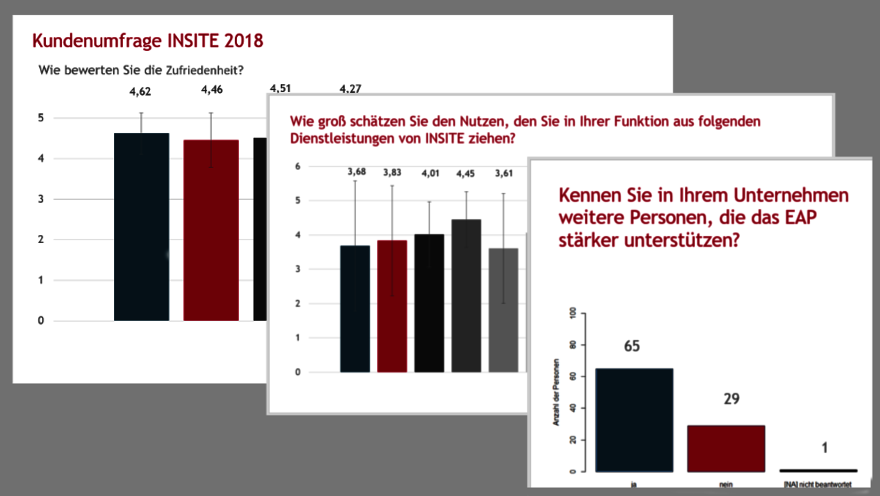In our client survey, we asked EAP officers in a number of different positions within their companies to tell us about what issues they feel are most pressing, what benefits they see in an EAP and how happy they are with their own programme. The survey had a high response rate and produced some interesting insights.
At the start of this year, INSITE surveyed its clients to find out what areas are currently in focus and which they would like more focus on. We wanted to know how happy they are with INSITE and the services we provide. What support EAP officers need so that they can advocate even more for EAP within their organisations.
And whether they were aware of and would recommend the services we offer. One of the most exciting questions was probably what EAP officers feel is the most important benefit of an EAP.
What was interesting was that many of the aspects respondents said they would like to see a greater focus on are ones we already cover. These include greater on-the-ground support, e.g. consultations but also emergency/contingency services and on-site company events, e.g. health and action days.
Lack of resources for EAP officers
It seems that there is a disconnect here between the information provided and a company's internal capacities. Depending on the size of the company, HR managers, for example, manage EAP/OHM on top of their regular duties. Clearly, even the resources required to make use of our services are sometimes severely restricted.
This is also something we heard in daily conversation with our clients. It's why they are extremely positive about the fact that we provide a comprehensive run-through of all our services when implementing an EAP or when contacts change.
Benefits of an EAP
Being able to access support through the EAP in emergency situations (e.g. accidents, suicide, traumatic experiences) was one of the main benefits mentioned by respondents. Our Instant Coaching for training managers and specialist roles in dealing with employees is also considered a huge source of support. The most relevant factor here is time, i.e. the ability to overcome difficulties and get back to work quickly.
The amount of time saved and the reduction in effort for those affected is one reason why our Find a Therapy service, for both in-patient and out-patient treatment, is also rated as a very useful tool.
Recommendations and ambassadors
Nearly 100% of respondents have already recommended or would recommend the INSITE EAP.
When asked whether they could imagine advocating even more for EAP communication within their organisations, almost ¾ of respondents answered "Yes". Obstacles include insufficient capacities among EAP officers and an initial reluctance among new users to engage with the EAP. In some areas, there is still a "psychological barrier" as it takes a bit of time for employees to appreciate the benefits.
Which is exactly why it helps enormously for as many roles within the organisation as possible to act as EAP ambassadors. People who have already received support from the EAP include health managers, occupational physicians, works and staff councils, and even trainers and managers at a number of different levels.
EAP communication
Communication and marketing of the EAP internally is considered vital to the programme's success. We can provide support here in a variety of different areas, such as attending health days and town halls, running on-site assistance and providing comprehensive communications materials, such as articles for employee magazines and intranets, posters, postcards and all manner of advertising materials.
We would like to take this opportunity to thank our clients for taking part in the survey with such gusto. We will use your input to further develop our EAP for you and your employees as a useful tool in your employee health toolbox.
